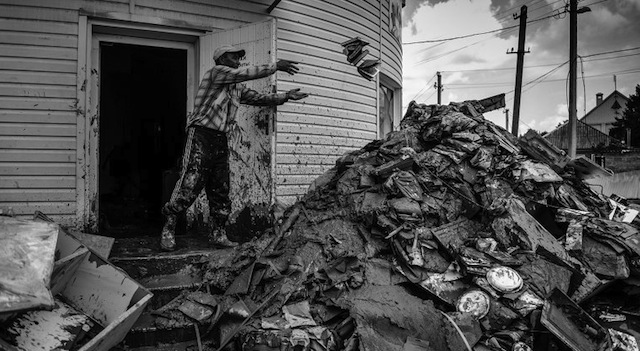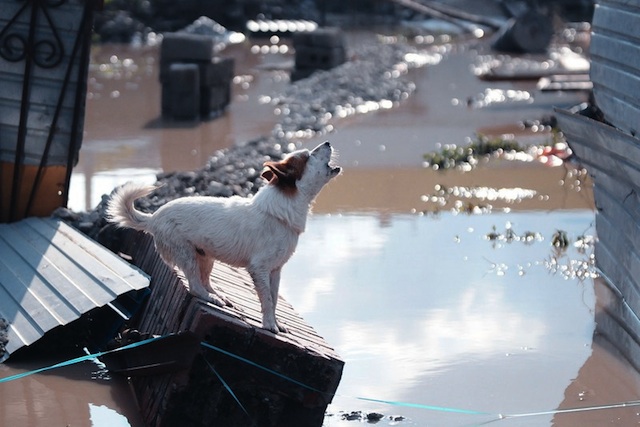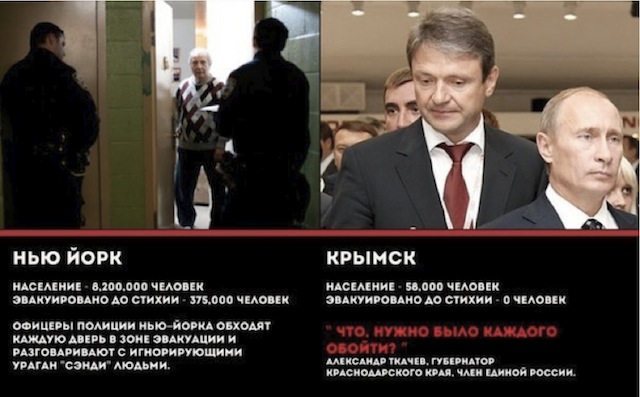A year ago, at night of July 7, the Krasnodar Krai was struck by the decade’s worst flood. The town of Krymsk was most affected by the disaster – the flood took the lives of 153 persons. The total number of deaths in the Krasnodar Krai was estimated at 171, 7.2 thousand of residencies were flooded, and over 60 thousand people were announced victims. For Krymsk, this is not the first tragedy of that kind; for example, in August of 2002, Krymsk became one of the areas, which were most highly affected by the flood. In 2002, 62 people died and 200 were considered victims.

Krymsk, 2012. Photo: RIA NOVOSTI
The formation and development of the natural disaster that occurred in 2012 was predictable, while its consequences could have been avoided. A few days before the tragedy, EMERCOM of Russia issued a forecast that suggested the possibility of the disaster within the period from July 4 to July 9. The authorities had a few days to inform population and organize evacuations of those residing in the most dangerous areas. However, as in 2002, information on the approaching natural catastrophe did not appear to be of interest or significance to the authorities. Not a single person was evacuated; moreover, residents were not informed about the upcoming flood. The official version of the administration is quite different: “At midnight, rescuers, administration, local public employees, and firefighters were gathered after an alert was raised. An emergency situation was announced through loudspeakers in the cars driving around the town. Evacuation started at 11p.m.” Krymsk residents, however, did not notice the actions; many of those, who resided in the most dangerous areas and who were not notified by their friends or relatives, died in the flood.
It has been a year since the Krymsk tragedy, and one might believe that everything that happened should be accepted as reality that, unfortunately, cannot be changed. Perhaps, it is quite difficult to get in peace with that situation because of the fact that the Krymsk tragedy revealed a whole range of familiar problems. One might think of negligence, lack of openness, indifference. Recollection of the Krasnodar Krai governor’s words – “Should we have knocked on every door?” – triggers thoughts about a huge gap between the authorities and the people. For some, it may sound surprising, but yes, they should have knocked on every door, everyone should have received the information about the upcoming disaster.
When in 2012, New York City with the population of 8.2 million was preparing for hurricane Sandy, 375 thousand people were evacuated. In the most dangerous areas, police officers stopped by every single apartment, telling citizens about the upcoming threat and persuading them to leave. There was an interesting picture posted in the blogosphere that showed NYC police officers talking to a local resident and Alexander Tkachev.
It happened so that the “victims of the fate” remained the “victims of the state”: calculations showed that financial support provided to the victims was too high and was subject to repayment.
With Sandy approaching New York, all leaders of the state and cities, public officials, reporters were in the immediate proximity to the area, press conferences were held constantly, and alerts were sent repeatedly. An opinion was shared that Obama reacted to the hurricane too quickly; ironically, that opinion belonged to Michael Brown, former head of FEMA in the Bush administration, who had been in the center of criticism for slow response to hurricane Katrina.
The response to hurricane Sandy embraced lessons of Katrina which, according to experts, showed that the American “nation was not prepared” to respond to emergencies in a proper way. Those lessons were taken into consideration and the majority of individuals residing in “the most individualistic country in the world,” did not feel that the state was indifferent to them. By contrast, Russian citizens, were left by the authorities and had to face the Krymsk tragedy on their own. Some estimates show that the total number of victims in the Krasnodar Krai was “by 1.5 times bigger than in all countries affected by hurricane Sandy, and 3 times bigger than in the United States.”
Perhaps, the authorities’ indifference is something to which Russians have to get used. One might remember the former mayor of Moscow, who did not want to cancel his vacation plans and come back to the city with a suffocating smog from wildfires, saying with irritation: “What is the problem? Do we have an emergency or crisis in Moscow? Is it a Moscow problem? Is there a crisis in Moscow? What can we, in Moscow, do about this situation? If I need to come back to show that I am here – it is one thing. However, what should have been done in Moscow, is already done. The system was developed.” For some reason, a number of political leaders from time to time try to explain their absence during an emergency by unwillingness to “PR on people’s suffering.” As Gazeta.Ru once suggested, during Sandy, one might talk as much as one wants that Obama and Romney decided to postpone their election campaigns for PR purposes, “These PR efforts, however, match normal practices for American politicians in this kind of situations.”

Coming back to the Krymsk events, it should be noted that after the flood, the authorities did not stay aside; for example, the victims of the flood received financial support. However, it happened so that the “victims of the fate” remained the “victims of the state”: calculations showed that financial support provided to the victims was too high and was subject to repayment. The Krasnodar Krai’s administration even sued some individuals in an attempt to return the money. After Vladimir Putin’s disapproval of those efforts, however, governor Tkachev promised to repay the already returned support money.
In March 2013, investigation into the authorities’ handling of the flood ended, and this past May, the trial began. The five individuals from the former Krymsk rayon leadership were charged with negligence and forgery. The Russian Investigative Committee called the Krymsk authorities’ conduct the “quintessence of cynicism.” Their conduct or actions could also be called “deadly indifference” (this is the title of a book co-authored by Michael Brown, former head of FEMA). Most likely, the five persons will be found guilty; this will not help save all the problems, however. As a reminder, in 2002, when the authorities also “neglected information on the upcoming emergency and did not provide for timely notification of the population”, the mayor of Novorossiysk was found guilty. In ten years, the story repeated and acquired additional tragic undertones. Perhaps, in order to eliminate cynicism and “deadly indifference,” 10 years is an insufficient period of time. Most likely, punishment of the “fall guys,” who, unfortunately, are only part of the overall system featuring a gap between the citizens and the state, will be insufficient either.
The Krymsk story, which reflects fundamental systemic issues, would have been completely dark without people who chose not to distance themselves from the grief that swept through the Krasnodar Krai. On the first days after the tragedy, volunteers started to arrive – in Krymsk, there were some 3 thousand volunteers from more than 30 Russian regions. They worked together with EMERCOM, often fulfilled multiple “dirty jobs,” and, compared to a number of political leaders, were not afraid of any self-PR accusations or anything else. Many of them just felt that their presence and help were needed at that time and that they were capable of making a difference. According to a Levada Center survey, 77% of Russians believed that during the Krymsk catastrophe volunteers “really helped the victims” of the flood.

It is currently a question if volunteers will be able to continue offering effective targeted support to people. The reason is an attempt to bureaucratize voluntary activities. As known, senators Alexander Borisov, Yuriy Vorob’ev, and Valeriy Ryazanskiy introduced a bill on volunteers in the State Duma. The bill was under development for a year and a half and gained a new impetus after the events in the Kranodar Krai. As the “Vedomosti” newspaper points out, “Those who try to institutionalize the voluntary movement, attempted to copy international experience, where the state knows volunteers, trusts them and can organize them; volunteers, in their turn, trust the state because the state does not interfere with their work in the areas, where volunteers are more effective." In Russia, this kind of trust-based relationship does not currently exist; that is why, quite understandably, a significant number of civic activists do not approve of this bill.
One might want the lessons of the Krymsk tragedy not to disappear. The “culture” of cynicism and “deadly indifference” should be destroyed. It should also be understood that organization of appropriate interaction with representatives of the “third sector,” including volunteers, is vitally important. It is not a secret that today successful emergency management is directly dependent on the effectiveness of cooperation. And the political will is required to achieve these objectives. Will it emerge or everything will continue to follow the familiar path, where only names of locations, types, scale, and dates will change?

